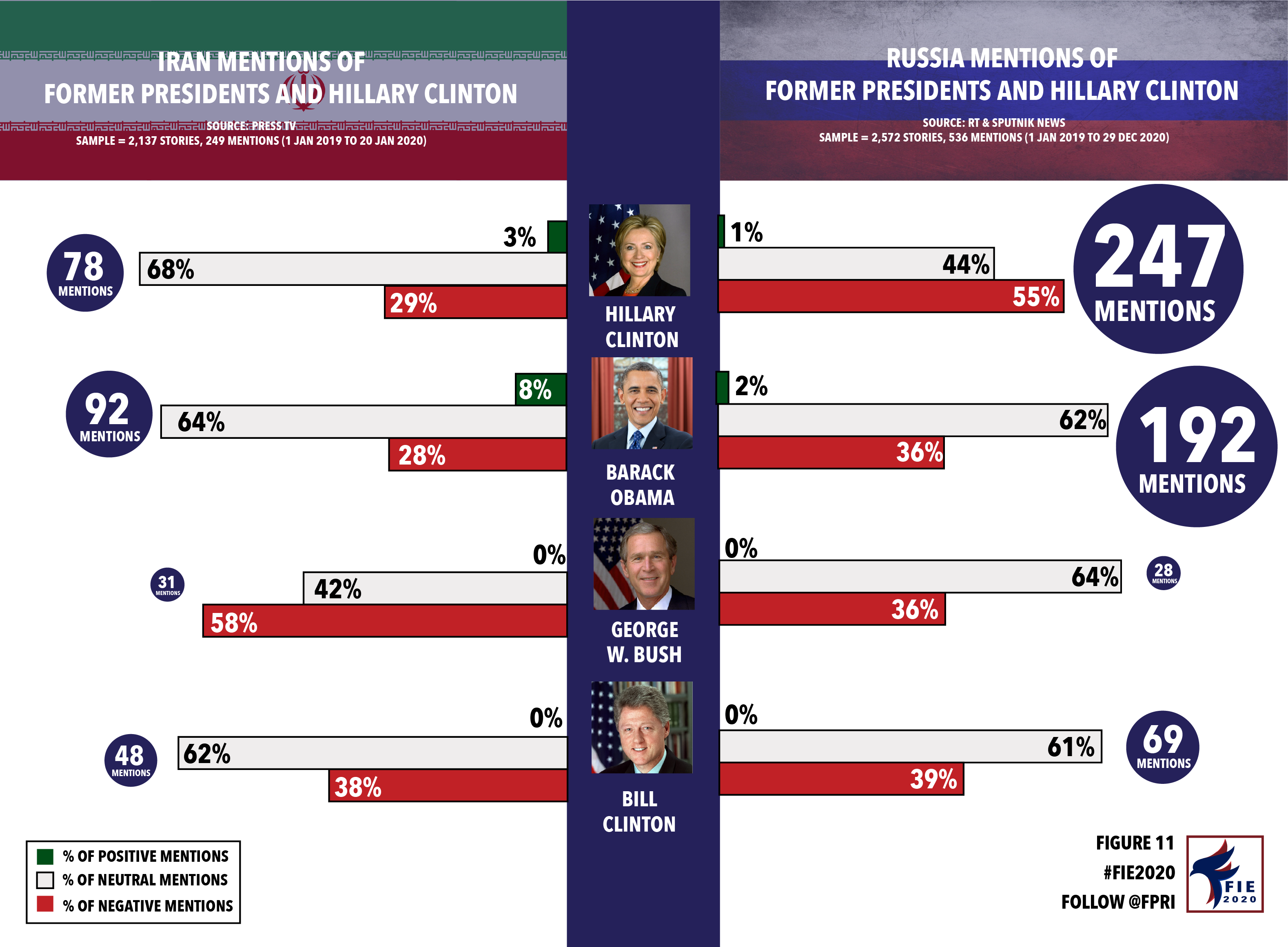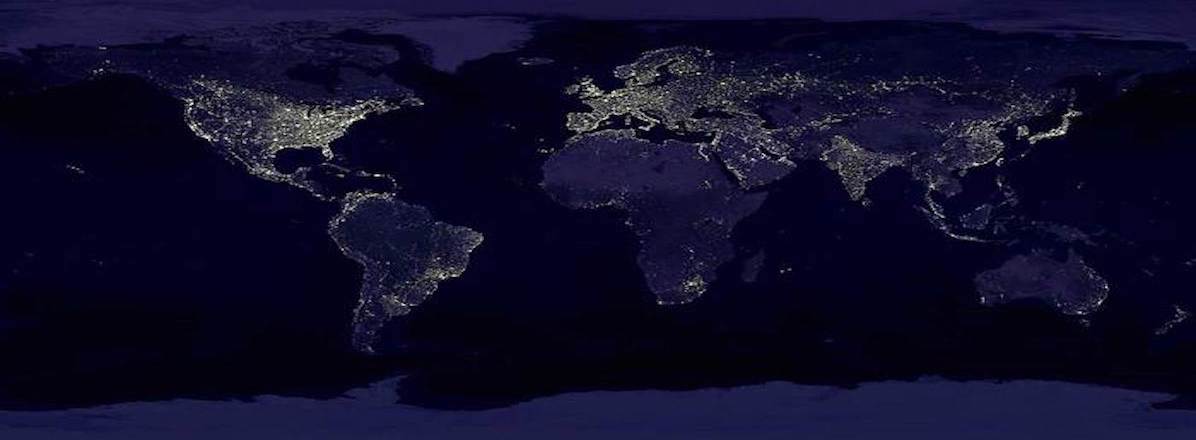A nation must think before it acts.
Russian and Iranian Media on Hillary Clinton and Former Presidents
February 12, 2020
Post by Rachel Chernaskey
Mentions of past presidential administrations and former Secretary of State Hillary Clinton have peppered foreign media coverage in the run-up to the 2020 election. Though largely out of the political spotlight these days, these individuals—namely, former Presidents Obama, Bush and both Clintons—serve as useful figures to evoke strong emotional responses from Americans because of their familiarity to voters and their records as politicians.
Given the vitriolic 2016 general election between then candidates Donald Trump and Hillary Clinton and controversies under the Obama, Bush and Bill Clinton administrations, these politicians can ignite deep-seated tensions. Foreign outlets attempt to highlight these tensions and weave controversial narratives back into the current news cycle to further polarize the American electorate headed into the 2020 election.
To better understand those narratives employed by foreign state-sponsored media, FIE 2020 tracked mentions of Presidents Obama, Bush and both Clintons in Iran’s PressTV and Russia’s RT and Sputnik News from January 1, 2019 to the present. Here are some consistent themes that emerge with regard to each.
Former Secretary of State Hillary Clinton
Former Secretary of State Hillary Clinton is regularly featured—and demonized—in both Russian and Iranian state media outlets. Clinton’s mentions typically use inflammatory language: Words like “crazy” and “narcissistic” are more common among headlines. Articles about Clinton are often sensationalist and even conspiratorial: One Sputnik News article implies Clinton might have been celebrating that Senator Bernie Sanders suffered a heart attack, an interview published by Sputnik asserts Clinton “famously wanted to kill [Julian] Assange” and a PressTV interview alleges Clinton was “funneling” weapons to ISIS during her time as Secretary of State. Both countries’ state media appear to use attacks on Clinton as a way to mobilize American populists and diminish the credibility of the U.S. political establishment.
Count Clinton’s mentions in RT and Sputnik News and it becomes clear that she remains a fixture for Kremlin media in 2020 (see Figure 11 below). With 247 total mentions from January 1 to December 29, 2019, Clinton received nearly the same amount of mentions as Obama (192), Bush (28) and Bill Clinton (69) combined. Within that time frame, 55% of Clinton’s mentions were negative, 44% were neutral and just 1% of her mentions were positive. Articles in Iran’s PressTV follow similar trends, though there are far fewer total mentions and negative mentions of Clinton. From January 1, 2019 to January 20, 2020, Clinton received 78 mentions, 29% of which were negative, 68% neutral and 3% positive.
According to FIE’s previous analysis, the proportions of Clinton’s mentions in Russian state media most closely align with those of former Vice President Joe Biden, highlighting RT and Sputnik’s disdain for establishment politicians. With regard to PressTV coverage, Clinton’s mentions most closely align with both Biden and President Trump, showcasing Iranian attempts to tarnish both establishment Democratic politicians as well as Trump, whose administration has had tensions with Iran.
Negative mentions of Hillary Clinton in Russian and Iranian state media usually align with the following narratives and themes:
- Establishment – Clinton is often painted as part of a corrupt establishment elite and as a toxic figure for the future of the Democratic Party
- Stories imply Clinton is unable to let go of her loss in 2016 and as a result continues to consider a 2020 run (a claim that has never been substantiated by Clinton)
- While both Russian and Iranian state media highlight tensions between Clinton and Trump, at times Russian media uses coverage of Clinton to excuse Trump, whereas Iranian media criticizes Trump
- Election integrity – Clinton and the DNC are often accused of allegedly sabotaging Senator Bernie Sanders’s campaign in 2016 and the narrative remains even after the 2020 Iowa caucuses
- Record as Secretary of State – Clinton’s handling of the Middle East as Secretary of State
- Tensions with Congresswoman Tulsi Gabbard – Clinton’s controversial statements about Congresswoman Tulsi Gabbard and the ensuing tensions between the two, including Gabbard’s recent lawsuit filed against Clinton
- Russian media and Iranian media diverge somewhat on this theme – Iranian state media often contrasts Gabbard’s military service with Clinton’s service as Secretary of State to criticize U.S. foreign policy in the Middle East, whereas Russian state media focuses on Clinton’s statements as a way to deflect concerns of Russian meddling in the 2016 election
President Barack Obama
Former President Barack Obama also features prominently in both Russian and Iranian media. Mentions of Obama run the gamut in tone, ranging from the mundane to highly critical.
From January 1 to December 29, 2019, Obama saw 192 total mentions in the Russian media. Like Clinton, Obama received far more negative mentions (36%) compared to positive (2%). In Iran’s PressTV, Obama saw 28% negative mentions compared to 8% positive.
Iranian state media often employs comparisons between Presidents Obama and Trump to paint Trump negatively. One conspiratorial video uses these comparisons to suggest the Trump administration is planning to support terrorist groups to advance U.S. goals abroad. Obama’s Joint Comprehensive Plan of Action (JCPOA) is also often starkly contrasted with Trump’s Iran policy and tense relations with Iran, representing Obama-era Iran policy in a more positive light.
Obama’s negative mentions in RT, Sputnik and PressTV surface in similar contexts:
- Wedge issues – Obama is painted as hypocritical on wedge issues, with immigration frequently cited
- Administration policies – State-sponsored media outlets criticize various Obama-era policies
- Handling of FISA warrant leading up to 2016 election – Allegations that the Obama administration targeted the Trump campaign in 2016
- Mainstream media coverage – Assertions that the U.S. mainstream media went easy on coverage of Obama and overlooked controversial policies
Other themes that feature Obama but are less directly critical of the former president include:
- Former Vice President Joe Biden’s role in the Obama White House, Biden’s friendship with Obama and Obama’s lack of endorsement for Biden in 2020
- Obama’s commentary on the 2020 Democratic candidates, particularly the progressive candidates, and his disapproval of “cancel” culture

President Bill Clinton
Former President Bill Clinton receives a fair amount of mentions from both Russian media (69 mentions) and Iranian media (48 mentions). Though Clinton is discussed mainly in neutral terms, he sees far more negative mentions than positive. In Russia’s RT and Sputnik, 39% of Clinton’s mentions were negative; in Iran’s PressTV, 38% of his mentions were negative.
Many of Clinton’s negative mentions highlight varying accusations of corruption and suggestions of criminality—both as president and in conjunction with Hillary Clinton. That said, former President Bill Clinton has recently gained more traction in the foreign press in two specific contexts:
- Clinton’s impeachment hearing, which has surfaced as a result of the impeachment inquiry into President Trump
- Clinton’s alleged connection to Jeffrey Epstein
- Iran’s PressTV uses this theme to push conspiracy theories about Epstein’s death and also assert alleged connections between President Trump and Epstein
President George W. Bush
Covered the least by both outlets, former President Bush receives roughly the same amount of mentions in Russian media (28) and Iranian media (31).
Though his mentions are close in volume, Bush is clearly less popular with the Iranian press. From January 1, 2019 to January 20, 2020, 58% of Bush’s PressTV mentions were negative. By contrast, from January 1 to December 29, 2019, 36% of Bush’s mentions in Russian media were negative.
Predictably, PressTV’s negative mentions of Bush generally involve his role in the Iraq War and the War in Afghanistan. In a number of articles, Bush’s record in the Middle East has been compared with Donald Trump’s foreign policy toward Iran.




